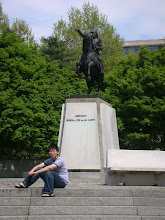I will not lie, I pass judgment too easily. On people, on cultures, on the world. It’s not the matter of hailing on the side of skepticism, I am just too damn judgmental sometimes.
I’ve been in Cairo for a little over two weeks and I can’t say I viewed this city or its denizens with eyes untainted with contempt. But this is slowly beginning to change. Where there had once been nothing but doubt, specks of admiration are forming. From the most optimistic and far fetched areas, my mind yells out: There is yet hope!
There should be no objection to the assessment that Egypt is underdeveloped. However, the city of Cairo has all the underpinnings to lurch forward unto the global stage as a city of preeminent wealth.
Cairo has spontaneity. A deep and intrinsic social connection bind the people of this city to coexist. While riding the Cairo metro I noticed an elderly man step into the train. A soldier sitting nearby immediately stood up and invited the old man to sit in his seat. Nearby a child bolted up to let the soldier take his seat. A few minutes later, a woman with a baby in her arms got on and people made room for her. Try observing that kind of compassion on the metro in DC or New York.
Egypt bustles with tourists and its population is closely followed by the tour guides. The amount of entrepreneurship utilized to attract customers is amazing. Their tenacity and advertisements are extreme to those from anywhere else. It shows terrific yearning to become successful and expand the enterprise into a larger one. Many of those that start off on the street, enticing tourists, manage to eventually run their own hostel and tour services. It’s not just the tourism industry either. From Tahrir square in downtown Cairo to El Maadi in the far south (and no doubt beyond) there isn’t a single block without some business or shop nestled amongst the homes. Cairo is alive with entrepreneurs and businesses that are willing to go far to be successful (like the taxi service, literally).
This ancient country has both the entrepreneurship and the moral sentiments (compassion and sympathy as evident on the metro). So why has it not lurched forward into wealth?
I feel that both the government and society are at fault for some of its immediate setbacks. But let me speak on the government, for I can speak on that most readily.
Cairo is devoid of trash cans. I’ve discovered a few in wealthier parts of town like in Zamalek, but overall to say that Cairo has an inadequate trash disposal system is an overstatement. Trash is disposed by its residents by simply leaving them on the street. Street sweepers may or may not collect it when they go by, but this is hardly an efficient system to keep the city clean. Even residents of the city do not have dumpsters, they leave trash bags at a designated location where they are picked up at night. The appalling amount of trash inhibits tourists from spreading their vast capital on the wider entrepreneurial population outside the five star hotels and museums.
The government can do much more to set up trash cans and educate the public on using them. However, the funds are most likely used up to maintain the standing police force and military police that guard every corner of the city. Yes, Egypt is a socialist dictatorship and its government is the greatest hindrance to the wealth of this particular nation. The police perform certain critical duties like traffic guidance. This does not seem like much, but having experienced the harrowing roads of Cairo, these rare forces of authority are a welcome influence. The rest of the police force seems to be doing their utmost to 1) stagnate the society by squelching social and intellectual movements and 2) taking part in a growing problem of harassing women.
Egyptian Center for Women’s Rights in July 2008 reported that 98 percent of foreign women and 60 percent of Egyptian women are harassed on a daily basis. Another report from the government stated that 47 percent of married women between 15 and 49 are subjected at least once to physical violence. The police and the military police are a large contributing force to these appalling figures.
There are other government policies that are problematic like food and oil subsidies, but that’s for another time. I think I make my case clear here.
The Egyptian people have the will and the potential to make the money and communally share the benefits of the wealth; however, the government is a large part of the reason why the country cannot take that final leap into spontaneously turning their efforts into capital.
Nonetheless, the most important thing for me to realize was that there is yet hope. I am sure there will be more on the social and political roles of development soon.
Subscribe to:
Post Comments (Atom)

No comments:
Post a Comment